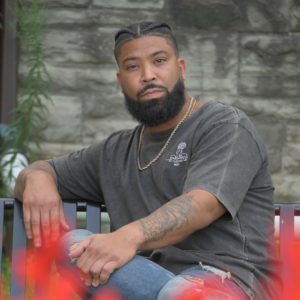York alumnus Matthew R. Morris (BEd ’11) is an educator, anti-racism advocate, writer and public speaker based in Toronto. In his recent national best-selling book, Black Boys Like Me: Confrontations with Race, Identity, and Belonging, Morris tackles the issues of identity that young Black students experience as they navigate their way through the education system.

“There’s this unwritten moral code of culture that exists and has prevailed for Black males to feel compelled to fit within one of two boxes,” says Morris. “Young Black men may feel that if they identify with hip hop culture and dress or look a certain way, subconsciously, it suggests that they are giving up a part of their intellectual capacity and academic priorities.”
In his book, Morris addresses the specific identity issues he faced in the classroom, when compared to peers of other cultures. He notes the social disadvantage that many students in his community faced.
“A chapter in my book is titled, “The Fresh Prince syndrome” after the popular TV show in the ‘90s, where I speak about the Will Smith and Carlton Banks characters and how young Black men must feel like they have to choose between one type of identity or the other,” says Morris. “It’s unfair for them to have to deal with this, whereas most other cultures are allowed to exist in a fluid continuum without any contradictions; it boxes them into limited possibilities.”
Morris’ introspection on his life and his desire to tell his story is partly inspired by his time as a student at York’s Faculty of Education. He recalls the York experience that helped him think about his identity and find his calling as an educator to help inspire and drive positive change in his community.
“Teacher’s college at York University was the first time in my life that I started to reflect on my experience as a Black male and how that is juxtaposed with being a Black student,” says Morris. “My time as a York student was originally where I thought of sharing a narrative of what it was like to navigate the school system as a young Black Canadian. Now as a teacher, I want to act as a role model for other young Black men growing up to prioritize academics and just because you look a certain way or prescribe to certain parts of culture, doesn’t mean you can’t prioritize academics.”
When Morris remembers his time at York, he identifies a York professor who helped shape his experience as a student and consequently the career path he sought out after graduation.
“There was an instructor named Chris D’Souza, teaching Foundations of Education. As a student, it was really the first time I experienced a teacher who prioritized marginalized people,” says Morris. “I felt like I didn’t have to conform to anything in his class and that experience helped me validate my lived experience and felt like there was something worth reflecting on and eventually writing about.”
When deciding where he wanted to pursue his plans of one day becoming a teacher, Morris points out the sense of community, acceptance and inclusivity that York provided.
“York just represents Toronto. When you stop on campus at York University, it’s a true representation into what Toronto looks and feels like.”
- Matthew R. Morris
“The idea of inclusivity and belonging was key,” says Morris. “When I was at York, it felt like I was back in high school in terms of diversity and representation. York just represents Toronto. When you step on campus at York University, it’s a true representation into what Toronto looks and feels like.”
Morris hopes that by giving back to his community, he can inspire future generations of “Black boys like him” to follow in his footsteps and to pay it forward to their own communities.
“It’s important to try to give back to your community in your own way,” says Morris. “For people from marginalized communities, give back to the next generation so that they have multiple models to look up to.”
Original article written and posted on the Division of Advancement - Alumni and Friends blog August 1, 2024
